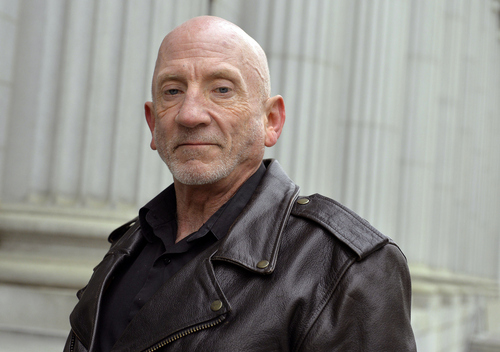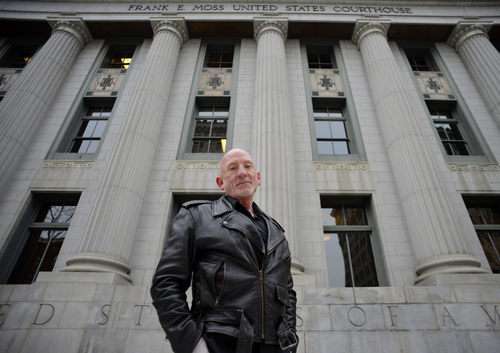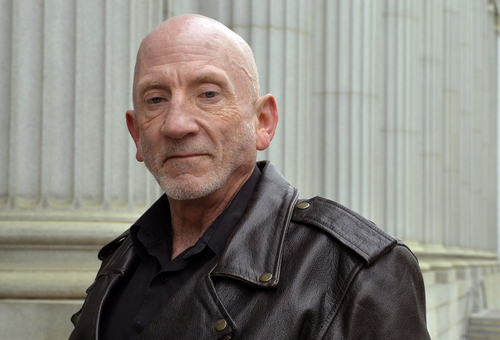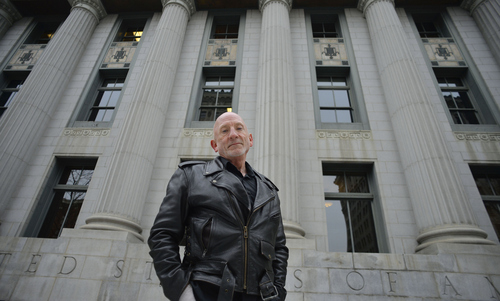This is an archived article that was published on sltrib.com in 2014, and information in the article may be outdated. It is provided only for personal research purposes and may not be reprinted.
When Mark Lawrence heard that a federal judge in California had overturned that state's constitutional amendment banning gay marriage, he had an immediate reaction: This could happen here.
Of course, most people thought Lawrence was nuts.
California is a blue state, Utah the reddest of reds. California has one of the nation's largest gay and lesbian populations with some 98,000 same-sex households, Utah has one of the smallest at 3,900. California is, well, California. Utah is Mormon central.
But the 57-year-old Lawrence was undaunted, even when national gay rights groups didn't take him seriously and local groups took a "wait and see attitude."
"It was kind of difficult to get them to pay attention to what we were doing," Lawrence said.
Lawrence began having "what if?" conversations with friends in July 2011, as California's legal fight over Proposition 8 continued its march through the courts.
While religious and conservative factions in Utah were an obstacle, Lawrence said the real challenge he faced was apathy.
"That was the hardest to overcome," he said. "I've never been one to accept apathy. I don't like it."
So he kept talking and meeting, talking and meeting. And soon he was convinced he was on to something.
In February 2013, Lawrence formally set up Restore Our Humanity for the sole purpose of staging a legal challenge aimed at toppling Utah's constitutional amendment banning same-sex marriage.
And he began searching for a legal team willing to take on the David v. Goliath legal fight, exchanging emails with several attorneys and having at least one conversation with a lawyer that went "nowhere."
Then, he met with two attorneys at Magleby & Greenwood in Salt Lake City. Within five minutes, Lawrence said he knew James E. Magleby and Peggy A. Tomsic were the perfect fit.
"It was magic," he said of that two-hour conversation. "They were very driven. I thought, 'This is it.'"
Lawrence is perhaps an unlikely candidate to be at theforefront of the gay community's effort to topple Amendment 3.
He is an information technology specialist with the Unified Fire Authority's emergency center and lives at home with his elderly parents. Lawrence moved in with his parents a couple years ago to help care for his father, who is in the later stages of Alzheimer's disease.
"I don't have much of a life outside of that," he said.
Lawrence came out to his family in the late 1970s, when he was 17.
"I've got a great family and parents who always showed great support," he said.
His past political experience consisted of protesting Anita Bryant, who in the '70s led an anti-gay movement, and being a delegate at a Democratic Party convention.
Six years ago, a bout with lung cancer rousted Lawrence from his own state of apathy.
"When you go through that, you look at things differently," he said.
To take his mind off chemo treatments, Lawrence began following politics, particularly events involving the gay community. The idea that maybe he could be part of making a change for the better took root.
By the summer of 2011, he was ready.
"This seemed like a good fit, like something I had to do," Lawrence said.
Lawrence said he found two couples willing to be plaintiffs in the lawsuit: Karen Archer and Kate Call, whom he had met through The Salt Lake Tribune's comment boards, and Derek Kitchen and Moudi Sbeity, whom he met at an LGBT Chamber of Commerce event.
The attorneys brought in the third couple, Kody Partridge and Laurie Wood, who were legally married in Iowa but unable to have their marriage recognized in Utah.
Sbeity's reaction?
"That scared me," said Sbeity, who owns a food business with Kitchen. "We hadn't had our business for a long time, and weren't sure how it would affect us, what it would mean for our daily lives. We were scared of putting ourselves out there and exposing ourselves."
But they kept talking to Lawrence and mulling it over as a couple.
In the end, "we thought it was a fight worth fighting for," Sbeity said, "that this would benefit us and everybody else. It was a fight not just to help us, but to help future generations of LGBT youth so they might grow up without the social stigma of being gay. With that in mind, we decided it was the right thing to do."
Plus, there was this: "We really wanted to get married," Sbeity said.
The lawsuit was filed in U.S. District Court for Utah on March 25 — a day before the U.S. Supreme Court heard oral arguments in the Proposition 8 and United States v. Windsor cases.
With more than 30 lawsuits over same-sex marriage bans pending in state and federal courts, most backed by gay rights groups, it may be understandable that a case brought by private attorneys in Utah — one of the nation's most religious, conservative states — got little attention or support initially.
Then came the pair of landmark decisions from the Supreme Court in June. Among those paying attention to the rulings: Patrick Byrne, founder of Overstock.com.
Byrne said he took particular note of how Justice Anthony Kennedy "went way out of his way" to say the federal judiciary would, as a result of the court's rulings, be hostile to attempts to discriminate against people. Within days, he got a call from Magleby and Tomsic asking for help.
"I think it is obnoxious for states to have an amendment to their constitutions discriminating against some people as far as who can love whom, who can marry whom," Byrne said. "I'm a small government guy. My great fear in life is overzealous government. This seems to be a very clear case of that."
Byrne pitched in $50,000 and agreed to speak to other business leaders about why ending the state's ban on same-sex marriage made economic sense. His message to them: "Amendment 3 was putting a black eye on the state" and potentially hurting business growth.
Byrne said he decided from the get-go, when he founded Overstock.com in 1999, to offer a "rainbow-friendly workplace."
"A company that [is supportive] can get some of the best talent out there that is frustrated by and has experienced unfriendly environments," he said.
Fast-forward to December. Lawrence was in the spectator seats as Tomsic made an impassioned speech before U.S. District Court Judge Robert J. Shelby about why Utah's ban harmed same-sex couples in Utah. He was at work the afternoon of Dec. 20, when Shelby issued his ruling. Like most people following the case, Lawrence didn't expect Shelby would rule until January.
"I couldn't believe it," said Lawrence, who immediately made the 12-minute drive to his home to more thoroughly check the news reports. "I was numb. I didn't know what to think."
He then made his way to the Salt Lake County Clerk's Office to witness first-hand the crush of same-sex couples queuing up for licenses.
Lawrence has taken the state's effort to block Shelby's ruling in good stride.
"This is normal process," he said. "I've been expecting this all along. This gives us an opportunity to take a breath, regroup and get some fundraising done. I actually think the stay is a good thing as long as it's not in place for very long. When we get through this process, everyone can calm down and relax, plan some nice weddings and do this."
The state has estimated it may have to spend up to $2 million to defend Amendment 3 and related statutes barring gay marriage.
Restore Our Humanity is also gaining support for a protracted legal battle.
In addition to Byrne's donation, Restore Our Humanity has held several small fundraisers to pay the "very large" bill due to attorneys handling the case. More are in the works.
And local and national gay rights organizations are now lending support and resources. On Thursday, for example, the National Center for Lesbian Rights, which tried but was unable to file an amicus brief in the federal lawsuit, has joined as co-counsel to represent the plaintiffs at the 10th Circuit Court.
The Utah Pride Center and Equality Utah also are on board.
"We're very happy about that," Lawrence said. "This has gotten too big for us now. We are talking to them now, and I think we are going to see a lot more cooperation with them."
That said, it's the individual responses that have really moved Lawrence — the $5 check from a Virginia man who said he was on disability but "just wanted to be part of it" and $10 from a Chicago man who said he was unemployed but wanted to help.
"Those are things I never expected," Lawrence said.
Twitter: @Brooke4Trib —
Another kind of 'legal limbo'
Utah counties that didn't finish processing same-sex marriage licenses for couples who turned in their paperwork before the U.S. Supreme Court ordered a halt to the nuptials Monday should finish and mail out the certificates, Utah Attorney General Sean Reyes said Thursday.
In Weber County, about 35 couples had turned in their paperwork on time but workers hadn't processed the certificates before the stay came down, according to a Wednesday news release from Ricky D. Hatch, the county clerk. When the stay came down, Hatch wrote that he held off on processing the certificates. With legal assurances from the Weber County attorney and Reyes, Hatch has ordered that the remaining certificates be processed. He said the couples should receive their certified copies through the mail in the next few days.
If the unions were solemnized before Monday, finalizing them is an "administrative function and not a legal function," Reyes said in a press release. He recommended that counties issue the certificates so the couples have "proper documentation in states that recognize same-sex marriage."
In Salt Lake County, meanwhile, couples who got a license but didn't have a ceremony in time could be eligible for a partial refund of their application fee. Regardless of the outcome of the court battle over Amendment 3, license applications expire in 30 days if they're not completed and returned. Salt Lake County Clerk Sherrie Swensen said she planned to ask the County Council's permission to issue refunds after the 82 incomplete licenses' expiration date on Feb. 3.
"We normally say no refunds, but I think this is kind of an extenuating, unusual circumstance," she said. Completing a marriage license is a three-step process: A couple gets an application for a $40 fee, is wed in a ceremony and has the officiant return the signed form. The union isn't legal until the whole process is done.
A total of 1,061 licenses were issued by Salt Lake County during the nine business days same-sex marriage was legal, compared to 279 the year before during that period.
If the council approves the refund, Swenson said her office could return $30 of the fee. By law, the other $10 has already been sent to the state for a Children's Defense Fund.
Couples would come into the county clerk's office and return the application with a note explaining why they couldn't finish the process.
Lindsay Whitehurst Proponents of same-sex marriage will gather at the Utah State Capitol on Friday at 12:30 for a press conference and to deliver an online petition, signed by 41,000 people, urging Utah Gov. Gary Herbert not to pursue an appeal of a ruling overturning Amendment 3.
The press conference will include remarks from Tim Wagner, who started the petition drive; Troy Williams, a radio host and gay activist; and Derek Kitchen and Moudi Sbeity, plaintiffs in the lawsuit that challenged Utah's ban.









